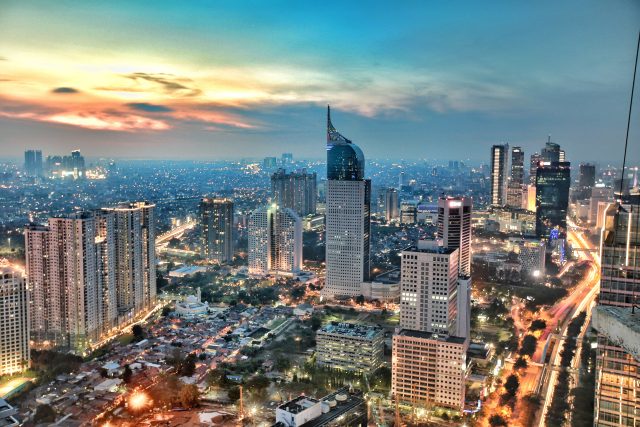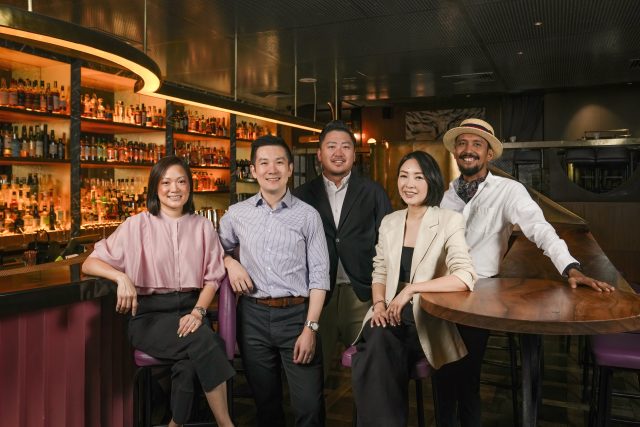This website uses cookies so that we can provide you with the best user experience possible. Cookie information is stored in your browser and performs functions such as recognising you when you return to our website and helping our team to understand which sections of the website you find most interesting and useful.
How will Indonesia’s new capital impact Jakarta’s booming bar scene?
The construction of Nusantara, Indonesia’s new capital, is well underway, with Independence Day marked in the city for the first time. Eloise Feilden considers whether Jakarta’s bustling cocktail scene can retain its relevance with the spotlight shining elsewhere.

Indonesia is on the cusp of a significant transfer of power as responsibility shifts into the hands of president-elect Prabowo Subianto. Prabowo, who speaks German, French, Dutch, and English, has his sights set on a bolder foreign policy than his predecessor, Joko Widodo, and hopes to build the country into one of the biggest powers of Southeast Asia.
Creating the new capital city will be the biggest legacy left by outgoing Indonesian president Widodo.
Plans to build a new capital for Southeast Asia’s largest nation were formalised in 2019 following decades of discussion about shifting the country’s hub away from Jakarta, a city facing the threat of sinking beneath the waves without urgent intervention.
Construction of Nusantara began in 2022, and five years after the decision was announced, the country has seen the first Independence Day marked in the city, which is still under construction. Traditional dancers, decked out in feathered crowns, performed in August’s independence day festivities. Young men, slick with oil, took part in greased-pole races to mark the occasion.
But with the spotlight shining bright on Nusantara, what impact can Jakarta, the current capital, expect?
Indonesian entrepreneur Indra Kantono is the co-founder of Singapore-based hospitality group Jigger & Pony. The company, which Kantono launched with wife and business partner Guoyi Gan, expanded into Indonesia this year with new cocktail spot Cosmo Pony, a joint venture with Indonesia’s Union Group.
Kantono is heartened by the country’s economic growth in recent times. “We can see that Indonesia is again becoming a growing economic power in the region,” said Kantono, who returns to the country often, having moved to Singapore 25 years ago.
Indonesia’s GDP growth is forecast to average 5.1% per year from 2024 to 2026, according to the World Bank’s Indonesia Economic Prospects report, despite headwinds from a subsiding commodity boom, increased volatility in food and energy prices, and rising geopolitical uncertainty.
Indonesia’s original capital remains the country’s financial and cultural hub, as well as the heart of its booming hospitality scene. Kantono, having bet big on Indonesia’s rising cocktail scene, is confident in Jakarta’s growing potential despite the shift in capital city. “Each time I visit, you can really sense the energy of the city,” he said. “It’s a city that’s increasingly becoming more cosmopolitan, more international in its outlook – the city itself is modernising.”

Cosmo Pony sits in the Grand Hyatt hotel in central Jakarta, and its co-owner isn’t worried about the future of the city and its bars as politicians build infrastructure in Nusantara. “I don’t think we’re too concerned about that,” he says. “If anything, this move of the capital is an indication that Jakarta is just bursting at the seams.”
Two Indonesian bars were named in Asia’s 50 Best this year, both of which are based in Jakarta. The Cocktail Club, which opened in 2021 in the bustling Senopati neighbourhood, won the award for the Best Bar in Indonesia 2024, highlighting just how important the city is for Indonesia’s cocktail culture.
Kantono compares Indonesia’s position with that of Australia in 1913. “When the administrative capital moved to Canberra, that did not diminish Sydney and Melbourne as the economic and cultural centres of Australia,” he said. “I don’t think Jakarta will be replaced as the economy capital. It is the financial capital of Indonesia. It is the commercial capital. It’s much easier for the government to move government offices and civil service to another place, but it’s much harder to move the port, the commerce, the international airport.”
If anything, the international bar owner sees the shift as a positive for the country. “I’ll be happy if Indonesia eventually has more than one economic capital,” he said. “If you look at bigger economies like China, you have Shenzhen rivalling Shanghai rivalling Beijing. I hope things can happen like that in Indonesia too, that Jakarta will still be one of the largest economic powerhouses in the country, but there may be more.”
Construction of the new city has not gone entirely smoothly, and the project, on the island of Borneo, has been hit with construction delays and funding problems. In August, the government was forced to cut back its independence day guest list from 8,000 to 1,300 just days before the festivities. Foreign diplomats were told they were no longer invited to the new capital, and were asked to attend celebrations in Jakarta instead.
Land-acquisition problems and the absence of foreign investors have marred Nusantara’s development. Concerns deepened after the unexpected resignation of the project’s top management in June.
Even so, the project has recorded IDR58.4 trillion worth of private investments so far, according to local news sources. The government intends for private investment to cover 80% of the total money needed to complete building Nusantara from scratch, with the whole capital-relocation project predicted to cost around IDR42.5 trillion in total.
FIFA, the international governing body for football, is among the city’s investors, having contributed funds worth IDR85.6 billion to build a National Training Centre at IKN Nusantara. It’s likely to take around 20 years for the city to fully establish itself. In the meantime, Kantono is dedicating his time to platforming Indonesia’s home-made spirits to both domestic and international patrons.
Cosmo Pony’s first menu is called ‘Rising City’, “which is a little bit of a pun about the fact that the city is physically sinking, and we do explain it that way to people,” he said. “We are trying to bring attention to who we are as people in Indonesia. Jakarta may be sinking, but we as people should rise.”
Related news
Could wine play a role in Chinese soft power?
Champagne Duval-Leroy announces significant expansion in China

